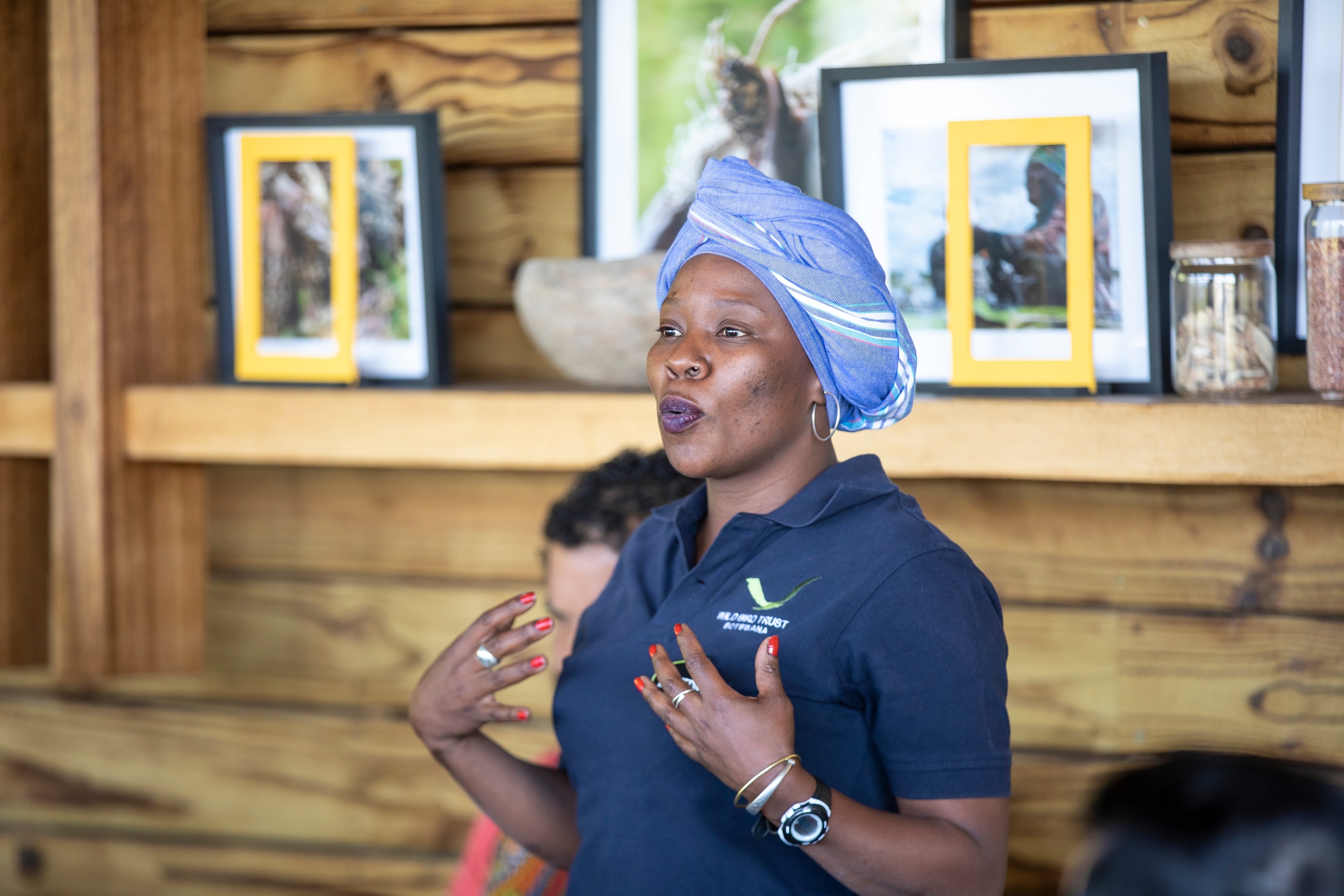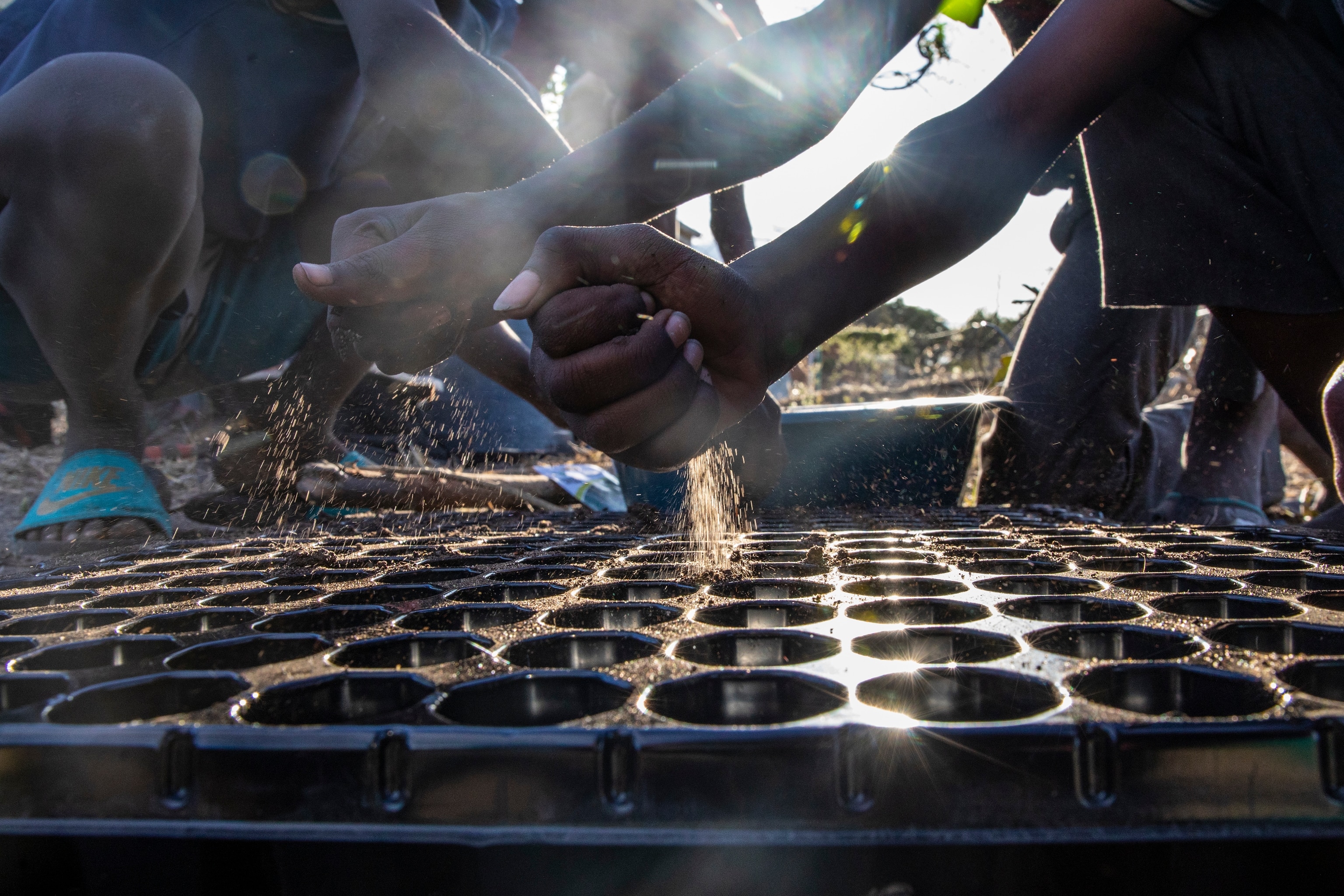Koketso Mookodi is working to establish a culture of conservation in the Okavango Delta
The conservationist and educator has established a program to inspire investment from teachers and community members

National Geographic Explorer Koketso “Koki” Mookodi is a conservationist, educator, and community facilitator, who has drawn on her background in tourism management to establish a successful conservation education program in the Okavango Delta.
Mookodi grew up in Gaborone, the capital city, only a few hundred miles south of Maun, where she now resides. Maun sits at the bottom of the Okavango Delta, and operates as a de facto “tourism capital” for the many who flock to Botswana to see the area’s famous wildlife each year.
Despite the proximity and growing up in an outdoorsy family, Mookodi says she was not aware of the Delta as a child. “The Okavango Delta,” she recalls, “was never part of my regular information intake, in school or in social settings.”
After high school, as part of a national service program, Mookodi was stationed with Botswana’s Department of Wildlife and National Parks, where she was able to both interact with wildlife and spend time educating young students about human-wildlife interactions.
“I was now immersed in this world,” she says, “where wildlife and conservation were actually a tangible and real thing.”
Afterwards, Mookodi began a degree program at the University of Botswana, but from her lecture halls she dreamed of being back in the wild. “I wanted more of what I'd experienced during my national service, but I didn't know how to get it,” she remembers.
After speaking with a friend who had worked in some of the luxury safari camps up north, Mookodi resolved that she would follow her passions. “I formally dropped out of university,” she recounts, “and jumped on a train and a bus to get here, not knowing a soul in sight.”
Mookodi soon found work with one of the leading tourism operators in the area.
Upon arriving, Mookodi says her first thought was “how could I not have known about this?” She decided to treat the safari camp like a university, learning the ins and outs of hospitality and the various departments that made the operation run.
Mookodi began to move around the Delta, working at camps and experiencing “the environment and the wildlife, but also the people.” At a camp near Gudigwa, a village of some 800 “Bukakhwe,” or San people, Mookodi began working with local primary school students, taking them on excursions into the bush.
“The focus and the dream and the passion has always been in the education side,” she says. Mookodi comes from a long line of educators. Her mother was a university lecturer, her grandmother a teacher for 50 years, her great-grandmother for 60.

Several years later, while completing a Mandela Washington Fellowship, Mookodi found herself in New York at the same time as fellow Explorer Steve Boyes, whom she had met in the camps a few years prior, and his associate John Hilton, who were working together on the Okavango Wilderness Project and at the Wild Bird Trust.
After Boyes asked if Mookodi would be interested in working with the Project, she says, “I said to Steve, ‘I will happily leave my job and join you if you will help me live my dream of helping nurture and co-create the next generation of conservationists, scientists, storytellers.’”
This time, her approach was different. Instead of working directly with students, Mookodi decided to focus her efforts on teachers in the Delta. Recognizing a dearth of scientists and conservation leaders coming from the Delta and knowing from experience that some of a child’s earliest understanding of what is possible for their life comes from teachers, Mookodi set out to develop a program that would inspire teachers, and thus their students, to take up the mantle of conservation leadership in the Delta.
She explains that many teachers in the area come from urban areas. They are often posted in the Delta by the government, not by choice, and that many are reluctant to be there.
“The roads are terrible, there’s no infrastructure, there are no facilities, there are no shops,” she says. “It can feel like you’re literally thrown in the middle of nowhere.” The situation, she explains, creates a lack of trust between community members and teachers. Attrition is high.
Mookodi decided that she could be a beacon for these teachers, concluding that if she could inspire them to “not give up on” the Delta’s communities, both parties, and especially the Delta’s students, could benefit.
“These kids know more about nature and their indigenous identity than the teachers can fathom." --Koketso Mookodi
Thus was born Educator Expeditions, whose stated purpose is to “sensitize educators of Ngamiland to the natural and cultural heritage of the Okavango Delta through science, research, and indigenous knowledge, enabling them to integrate their experience with nature into their academic routines and to accomplish an improvement in overall academic results.”
The project is underway at the primary school in Gudigwa. Mookodi says that the relationship between teacher and student is especially symbiotic in this environment. “These kids know more about nature and their indigenous identity than the teachers can fathom,” she explains.
By getting teachers involved with community elders and taking them into the field, she hopes to create a cascading effect whereby teachers become invested in the community and pass that enthusiasm on to their students. The project has executed four Educator Expeditions and reached some 40 teachers since its inception.
“What we’re trying to unpack,” she says, “is how do we help these communities retain and preserve their heritage and be able to make an income and still stay in the area and continue to be stewards?”
Mookodi is optimistic about the project’s prospects as they look to expand their efforts to more schools and communities. “The benefits are there,” she says, “and can only increase if we keep each other informed and educated.”
ABOUT THE WRITER
For the National Geographic Society: Andrew Rasner is a Digital Production Manager for the Society.